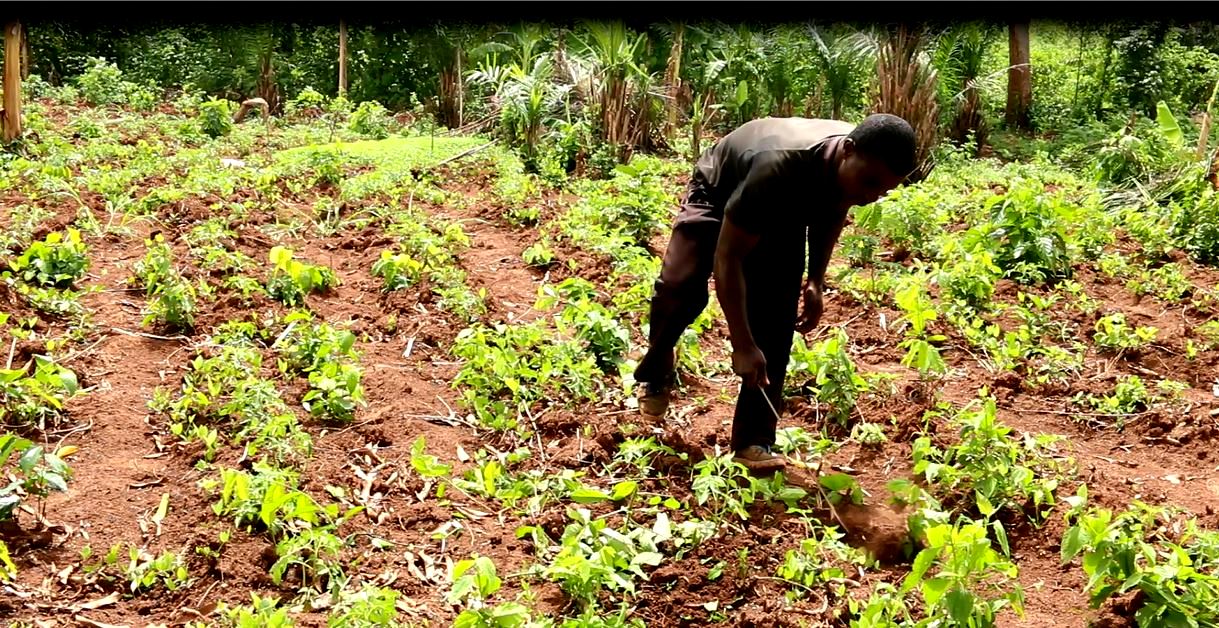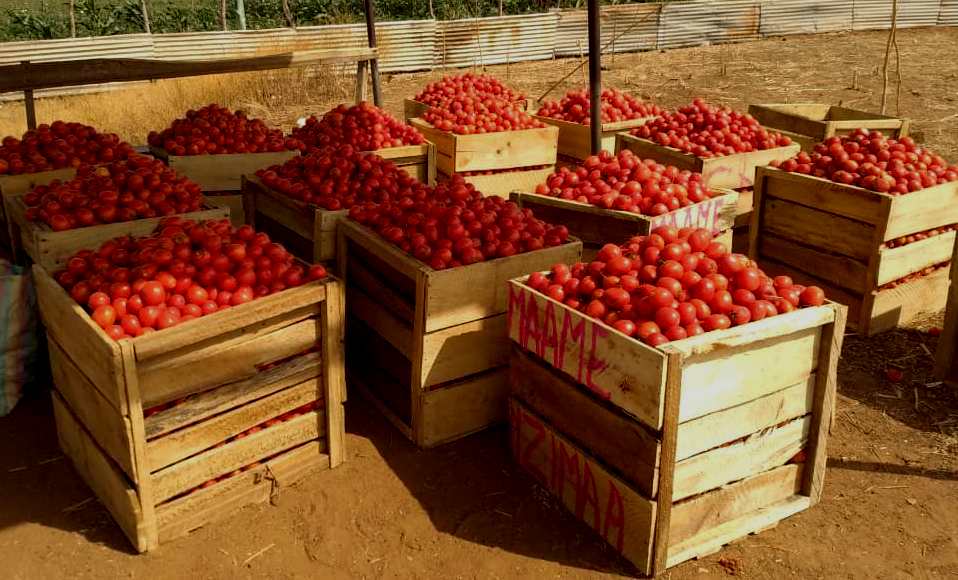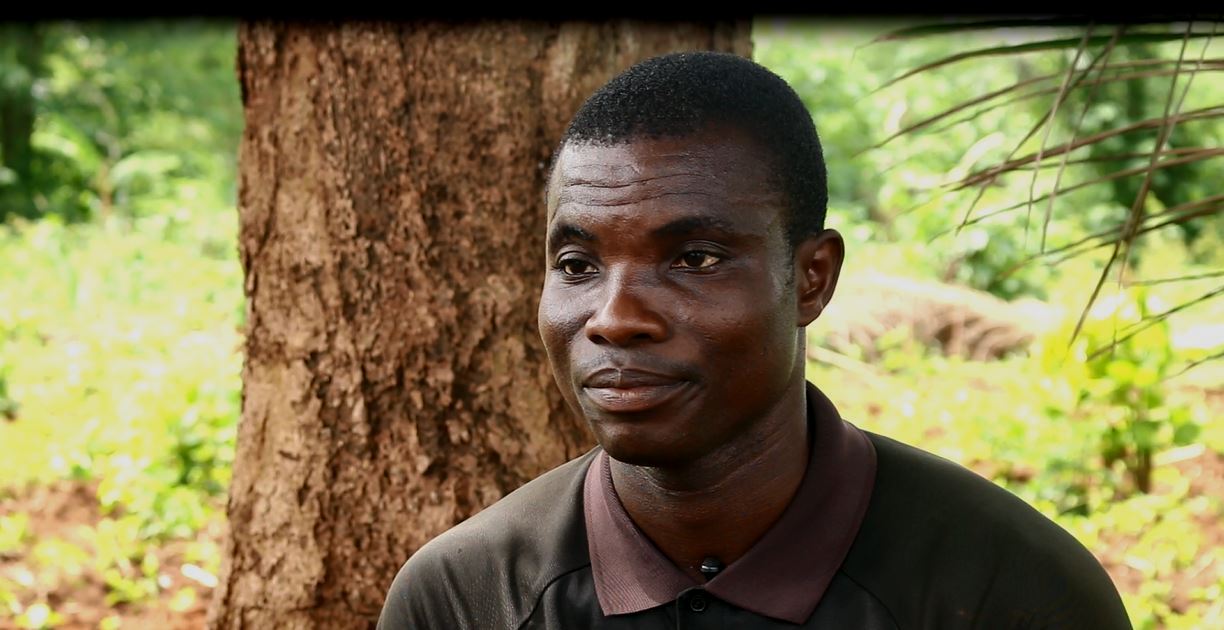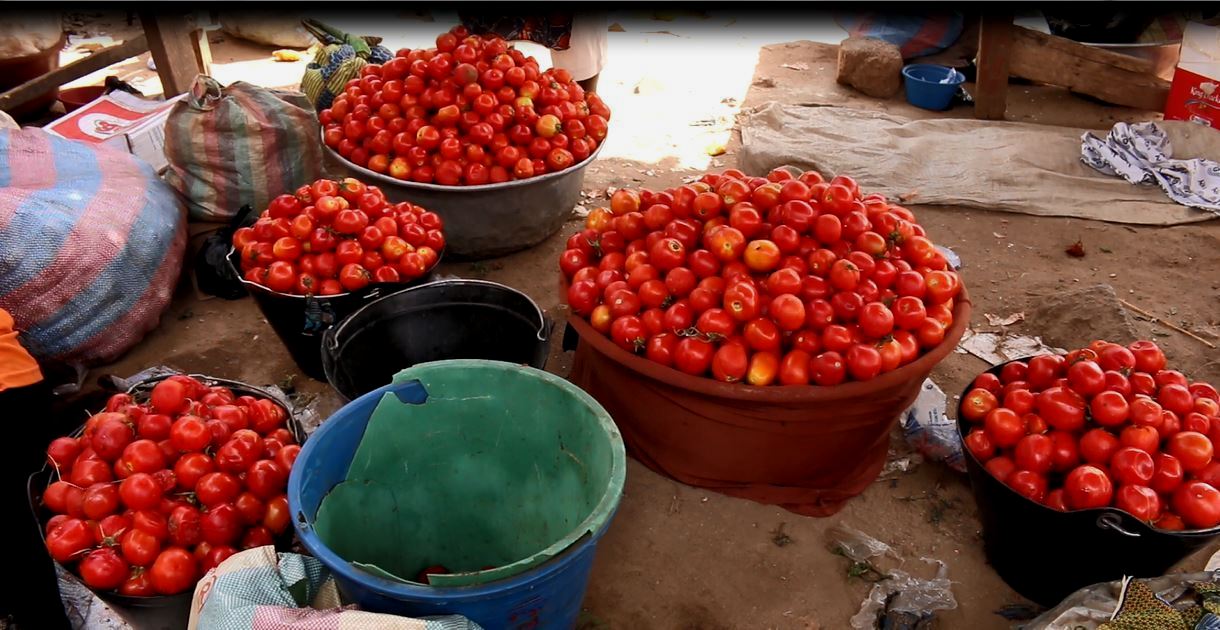The Ghanaian government thought that processing tomatoes into paste would help its starving and desperate farmers. So canning factories kept being festively opened. Only they never worked. How harvests go to waste next to idle canning factories.
“There was this pesticide; it was called Aerocon. Reddish in colour. Two of them drank it and they died because they had borrowed a huge amount from money lenders. It is true. I witnessed it”. Collins Offiman Takyi, municipal chief executive officer for Tano South, confirms the death of two tomato farmers, identified only as Abuu and Appau, who committed suicide after they could not sell their harvests last year. According to regional sources, similar deaths -either by poisoning or by hanging- have occurred in Akomadan in the Offinso North District of the Ashanti region; and in Derma, Techimantia and Subriso, all tomato farming areas in the Ahafo region. They have also occurred in Zaare, Vea and Bolgatanga in the Upper East.
Sometimes farmers also simply leave, to go into ‘exile,’ as it is called, since no one knows where they are going.
It has happened every year since at least 2007. A Ghanaian News Agency report from 2009 notes that “in the Upper East Region there is no tomato season that passes without some farmers committing suicide as a result of frustration. As a matter of fact it has become an annual ritual.”

Ghana is one of the world’s top tomato consumers per capita, but it can’t sustain its tomato farmers, who in regions like Ahafo and Bolgatanga make up seventy percent of the population. Tomato diseases, production cost, failing irrigation systems and government neglect make them unable to compete with neighbouring countries like Burkina Faso, a lower-income and lower-production cost country, where agricultural produce sells for much less. “The market women will come and leave our tomatoes here. They prefer to go to Burkina and buy. Mine always go waste. That has been my predicament,” says Kwabena Asante (40) who farms in the Ahafo region.
Frustrations will force you to commit suicide by poisoning
His colleague Issahaku Ayama, who won Upper East Regional Best Tomato Farmer in 2012 and 2013 but now also sees his harvests go to waste on the fields, agrees: “the traders who buy on large scale prefer to buy from Burkina Faso. Frustrations will force you to commit suicide by poisoning.” Several farmers say they feel despair when they see the market women’s trucks passing through the region on their way to Burkina Faso and Mali.
Forcing and persuading
Local authorities sympathise. Officials of Ghana’s Food and Agriculture department have tried in vain to apply the only solution they could think of: to persuade the market women to buy from Ghanaian tomato farmers. But “even when you ask the women what (kind of ) tomato they want to buy, and you tell the farmer here to cultivate that kind, they still go and get it in Burkina,” says Upper East regional extension officer, Zimi Al-Hassan. Al-Hassan feels that the market women should be obliged to buy Ghanaian. “The only way that we can address this concern is through contract farming so that when they produce and the buyers refused to buy, the farmers can institute legal action against the market women,” he says.
But forcing the market women to buy more expensively is not likely to work: they would then feel obliged to raise the prices for consumers, -and food is already expensive for most Ghanaian citizens. Raising import tariffs so that Burkina tomatoes would become more expensive to the market women would have the same effect. A 2010 research study by the International Food Policy Research Institute IFPRI in Washington, USA, warns against such measures and advocates more support for national farmers instead.
The women prefer Burkina tomatoes
The women themselves are adamant that they prefer the tomatoes from Burkina. Ghana’s tomato farmers don’t produce as much as they once did, says Lorencia Asibi, who is taking a break in Upper East’s Paga border town on her way back into Ghana from Burkina Faso with her truck, helpers and interpreters. “Those few of them who are still in business can only fill a KIA (van), but not this large cargo truck.” Ghanaians like Burkina tomatoes, she says: they are cheap, they don’t have as much chemicals. She adds that diseases like nematode in Ghana are also a problem. “Ghanaian farm- ers used to produce quality tomatoes but the story is different now.”
A report from Ghana’s own ministry of agriculture, dated 2017, highlights important failings of its own policies in this regard. Over 2016, it mentions that improved seeds and fertilisers were supposed to be provided, as well as expert assistance for farmers to help them “modernise agriculture.” But “inadequate quantity and quality of storage space for the seeds and fertiliser at regional and district offices,” combined with “inadequate (transport) logistics,” a “limited number of (training) personnel,” an “inadequate supply of seeds,” not to mention an “unavailable farmer database,” bedeviled the efforts. The only thing the ministry did manage to deliver in its entirety, according to the report, was a (written) “production guide.”
The only thing the ministry delivered was a written production guide
Tomato paste
Remarkably, the report doesn’t mention the fact that there are five tomato canning factories in Ghana: one for each tomato producing region. Northern Star, in Pwalugu in the North; Wenchi in Bono; Derma in Ahafo; Nwasam in the Eastern region, and Tema, close to the capital, Accra. Fully equipped, repeatedly refurbished and sometimes also repeatedly inaugurated, they have been announced to solve the problem and save the tomato farmers by various governments at different times. But the most any of these have worked is a few years – at the most.

Pwalugu was part of the reason why Issahaku Ayama did so well in 2012 and 2013. “I never ran at a loss when that factory was in operation,” he reminisces.
The Northern Star factory is the oldest tomato canning factory in Ghana. It had been one of the legacies of Ghana’s first president after independence in 1960, Kwame Nkrumah, but it was first closed in 1967, after Nkrumah had been overthrown and it had spiralled into debt. It had been reopened close to four decades later, by the John Kufuor government in 2006, but it had only worked for one year then. A new government refurbished and inaugurated it again in 2010. Then – it is the period that Ayama remembers so well – it worked for two years.
The processing plants in Wenchi and Nsawam have never worked since the eigh- ties, says the IFPRI report. It mentions “a combination of structural reforms promoted by the World Bank and the International Monetary Fund (the World Bank and IMF generally advised to bring down state investment in general in agriculture, OT), frequent breakdowns resulting from a lack of spare parts and obsolete machinery, lack of technical competence, bad financial management and poor marketing” as causes for the failure. “The following two decades can be characterised by multiple failed efforts to reopen the factories to process domestically grown tomatoes,” the report adds.
Beside the above mentioned issues, the IFPRI report also warns that even with sound financial management and good ma- chines the problems will not be immediately solved. Assistance to farmers will be crucial to keep up supply to the plants, it says, because a processing factory - rather like the market women- will need much more and much cheaper tomato supply than possible at present, especially if it is to compete with imported paste from Europe and China.
Puzzlingly however, consecutive agricultural and trade ministers, regional officials and even presidents (Kufuor in 2006, Atta Mills in 2010, Mahama in 2015) keep re-opening the factories and saying that this will now solve the problem once and for all. Mahama has even come to conduct an opening ceremony of the same plant, Tema in Accra, twice, expressing hopes for local tomato processing both in 2015 and in 2017. In 2019, Tema is still only repackaging imported tomato paste.
We have been neglected with no attempt from government to resolve the matter
The failed efforts are among the most cited painful experiences in our interviews with farmers. Kwabena Asante was about twelve in 1992, when there was a plan to reopen the Wenchi plant, but that never progressed beyond the level of the feasibility study that was carried out then. “We have been neglected with no single attempt from government to help resolve the matter,” he says. Osman Salifu (53) still has hope that the factory in Pwalugu will be reopened again, as new Upper East regional minister-designate, Paulina Abayaye, has promised to do in November last year “as soon as she is confirmed and sworn into office as a Minister.” “It will help us,” Salifu says. He won the prestigious National Best Tomato farmer award in 2004, but has not broken even for several years.
Meanwhile, no politician or official in Ghana has ever been fired for the project failures. The caretakers and administrators of the tomato paste factories still come to work at the dilapidated structures every day to sit around and observe.
 Kwabena Asante. Photo Zack Ohemeng Tawiah
Kwabena Asante. Photo Zack Ohemeng TawiahNo response
Repeated phone calls made over a period of a week to Ghana’s Ministry of Trade, which is in charge of the factories, have not been met with a response. One deputy minister, after earlier agreeing to give an interview, switched off his phone. The other deputy minister did not respond to phone calls at all. The minister who had also initially agreed to an interview but later said he was delayed in Senegal, also did not respond again for several days afterwards. A member of the government’s economic team said he had no permission to speak to the issue and recommended that we speak to the minister of trade or either of his two deputies.
In Ahafo, Kwabena Asante carefully strikes his cutlass in multiple careful strokes on a rock. His left hand intermittently pours water to sharpen it. Het then sets off to clear the weeds that have sprung on tomato beds on the field.
Ghana’s food supply at risk
Farming and local food supply are generally in danger in Ghana. The World Bank projects a fourfold increase in the country’s food import bill over the next twenty years, with the country becoming a net importer of basic food unless local production is increased. According to a 2017 World Bank Agriculture Sector policy note, Ghana’s annual food import bill now exceeds even the estimated annual cocoa earnings of two billion US$.
The trucks at the border
At the border town of Paga in Ghana’s Upper East region, every morning, a convoy of trucks loaded with tomatoes in carefully arranged wooden and paper boxes enter here from Burkina Faso into Ghana. The drivers joyfully respond to colleagues driving from the opposite direction by blowing the horns of their trucks. Those travelling from Bolgatanga in Ghana have empty wooden boxes packed in the cargo truck, those from the opposite direction have several boxes filled with fresh tomatoes. Those that come from the Paga direction towards southern Bolgatanga have market women seated on boxes filled with tomatoes.
They look weary, having travelled several hundreds of miles from Ghana’s south either to Burkina Faso or Mali, through the desert for several days without sleep or shower.
Thirty-six year old Gifty Agyene from Prestea has nine years’ experience in buying tomatoes from Burkina Faso, she says, adding that she travels four times a month and spends 40,000 Ghanaian Cedi, about US$ 7,500, on each trip. Today, she has been sitting for hours already on top of her truck from Kaya, ninety-four kilometers north of Burkina’s capital Ouagadougou, with eighty boxes of tomatoes. She hopes to arrive in Prestea in Ghana’s south in two days. With the help of an interpreter she travels around Burkinabe towns and cities to buy tomatoes from the Mossi farmers who, she says, produce the best. She sacrifices for her trade. Besides not or only intermittently sleeping for at least four days, her hired interpreter charges her two thousand Central African Francs (CAF), slightly more than three US$, per every box of tomatoes bought. Ten farm hands whom she employs to sort, arrange and pack the tomatoes charge between five hundred and a thousand CAF per box. None of them, including Gifty who travel day and night, have any life insurance cover. “This tomatoes business is the most difficult and cumbersome venture I have ever seen. Whoever says it’s not difficult is a liar,” she says. The risk involved in the tomatoes supply chain process is enormous. Traders have become targets for local and foreign highway robbers who often attack them. Gifty recounts how armed men have at- tacked her and her team on this road and says she now pays extra money in bribes to Burkinabe soldiers to escort her and her team in robbery-prone areas. Traders and their truck drivers are also often involved in accidents, sometimes deadly. At least ten accidents involving five deaths, have been recorded on the Paga-Bolgatanga stretch between February and April this year alone.
But despite the risks involved Gifty will return next Thursday to buy tomatoes from Burkina Faso. “Burkina Faso has more fertile land than Ghana. There are too many chemicals in tomatoes pro- duced in Ghana. In Burkina most of the farmers use cow dung. Burkina Faso’s tomatoes look good, hard and they are abundant,” she insists, as her truck moves on, Ghana way.


